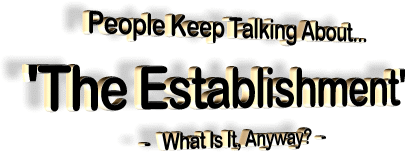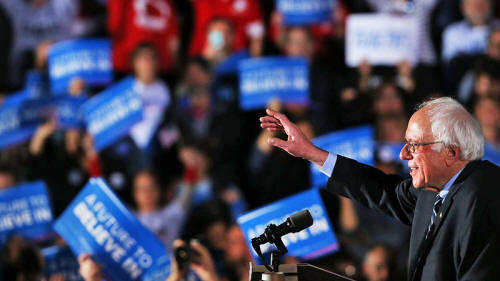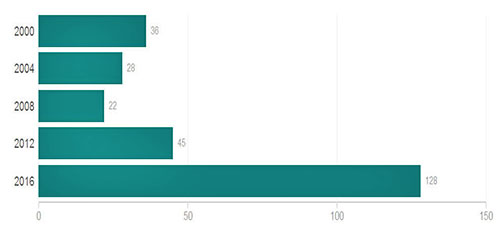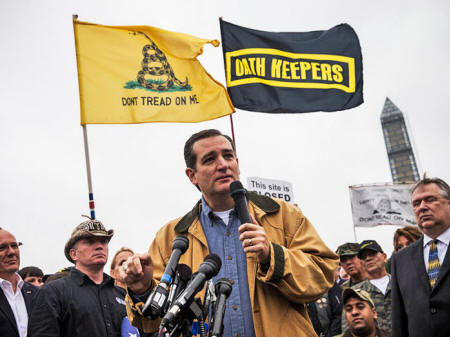|
February 11, 2016
Bernie Sanders won the New Hampshire primary - and he's not even a Democrat.
He's one of the
firebrands upending "the establishment" in 2016.
He adds,
This idea is at the core of what establishment means in the 2016 presidential race, according to one (actual) political analyst.
No one wants to be the square who hates rock 'n' roll. And no one wants to be "establishment" in the 2016 presidential race.
Hillary Clinton quickly distanced herself from the label when Bernie Sanders used it against her in the last presidential debate.
Republican Jeb Bush only grudgingly accepted the label.
That's too bad for him.
As political strategist Mark McKinnon told NPR, this is the most anti-establishment race he has ever seen.
In fact, here's how he defined "establishment":
A 2016 Phenomenon
Talking about the establishment and who is in it seems to be all anyone cares about this election.
We tried to track how much the party "establishments" were talked about in major newspapers. In the month before the Iowa caucuses this year, the establishment was mentioned 128 times in the pages of the,
...by our count.
In 2012, it was 45 times. (For more on how we counted this, see the note appended to the chart.)
To be clear, this isn't exactly a scientific study - it's a sample of only four newspapers. (We didn't count blogs and other Web content because of the explosion in those things over this period).
And it's also true that in two of the elections we looked at, only one party was nominating a candidate. But the data is evidence that, for whatever reason, the "establishment" (whatever it is) is everywhere right now.
Google Trends data likewise suggests a sizable spike for the search terms "Republican establishment" and "political establishment" (just searching "the establishment" may be too vague, as it also relates to searches of the Establishment clause of the Constitution).
The 1960s Rise (or Maybe Fall) of The Establishment
In a 1968 New Yorker article, British journalist Henry Fairlie claimed credit for inventing the term "establishment" in the modern, political sense.
(However, he traced usage of the term back to Ralph Waldo Emerson, in an 1841 speech called "The Conservative.")
Writing in 1955 about the disappearance of two U.K. Foreign Officers, Fairlie used the term to describe the powerful people, who, among other things, defended the officers' families from the press.
Fairlie had a definition that was simultaneously specific and amorphous.
He said he wasn't referring just to "centers of official power" like the prime minister, but rather to a variety of other powerful people, including the head of the BBC and the Times Literary Supplement's editor.
Even in 1968, there was frustration over the word's meaning.
Writing 13 years later, Fairlie observed that his idea had grown in popularity and spread across the Atlantic - and he mourned that it had, in his opinion, lost its meaning, thanks to weekend columnists who decided to,
Interestingly, journalist David Halberstam has since put the establishment's "high-water mark" in 1960, when John F. Kennedy was elected president.
This may also be when the explosion in the term's usage began. According to data from Google, usage of the terms "Republican establishment" and "Democratic establishment" in books skyrocketed around 1960.
(Once again, NGrams isn't a perfect tool, so this should be taken as just a loose indicator. For example, there are some results mixed in that discuss other countries, but a scan through the results also shows that a majority of the mentions since the 1960s seem to refer to American politics.)
So what was happening in the 1960s?
One thing was that the parties were loosening their grip on one of their major functions: nominating candidates. Primaries existed then, but before the 1960s, delegates would go to the national party conventions without knowing exactly who would be the nominee.
It wasn't the coronation ceremony it is today.
Frustrated with this system, Phyllis Schlafly lambasted the establishment in A Choice Not An Echo, as Dave Weigel wrote at the Washington Post earlier this year in his own dissection of the term. Schlafly uses a series of anecdotes to show how groups of "kingmakers," including businessmen and ambassadors, chose moderate candidates that went against what she thought were the GOP's interests.
To Schlafly, the establishment was a conspiracy.
She described it as,
How did they do it?
By,
But then, Schlafly was fighting for Barry Goldwater, the outsider, far-right candidate who was running for president. And she got her wish in 1964, when the Republican Party nominated Goldwater.
Though he was soundly defeated in the general election, his nomination was the start of a political shift in the GOP.
The "Eastern establishment" is a popular variant of the term, one that carries with it not only geographic connotations, but in Halberstam's telling, also the trappings of Ivy League educations and old money.
This vague combination of party elites and wealthy "kingmakers" (for example, the Rockefeller family), who supposedly ran the show, began to decline in the 1960s and 1970s, writes Halberstam.
His reasons:
And not everyone was convinced that the "establishment" existed.
Writing in 1967, the New York Times' James Reston wrote that this hypothetical group should have been trying to find a candidate to "stop Nixon" in the 1968 presidential race.
What The Establishment Was - And Wasn't
To read news stories about the establishment over the decades is to see the group described in the same undefined-but-we-all-know-who-we're-talking-about terms as today.
For example, Schlafly and Reston both seemed to agree - albeit to vastly differing degrees - that influential and moderate people were calling at least some of the shots.
The establishment was also not blue-collar.
Who would best capture that vote?
The "un-establishment" Ronald Reagan, he wrote - a man who failed in 1968 but would eventually win the White House.
Powerful, rich, old, out of touch, secretive, moderate - these are how the establishment has been painted over the years.
The players may have changed, but those connotations have stuck around for decades.
Ted Cruz, pictured here at a 2013 rally in Washington, D.C., enjoys support from the Tea Party, one of the strongest anti-establishment forces in the past few years. Andrew Burton/Getty Images
What Does Establishment Mean Now?
So why has establishment taken off now? Because people hate the establishment right now.
But before we can get to why, let's back up and try to find a simple definition.
They may not choose candidates in smoke-filled convention rooms, but they have their own way of pushing particular candidates. (Limiting the number of primary debates or deliberately putting them on low-TV-viewership nights are a couple of examples Cohen cites.)
But a much more important way the establishment functions is by making endorsements.
When a governor says he likes Marco Rubio or doesn't like Ted Cruz, it's not just a signal to the voters; it's a signal to other high-level politicians who themselves will give endorsements.
And this may be the easiest shorthand for what it means to be establishment: who leads in endorsements? The top endorsement-getters on the Republican side (who are still in the race, that is) have been Rubio, Bush and John Kasich.
On the Democratic side, it's Clinton, by a gargantuan margin.
Not coincidentally, those people are often linked with the "establishment" in news stories.
But then, anyone who reads those stories knows that "establishment" has also become shorthand (well, technically, longhand) for "moderate," not to mention for people who have spent long years in Washington - or who have connections to it.
And it's easy to see where these additional definitions came from. If the establishment is choosing candidates who are known quantities and who don't "rankle any one particular faction" too much, as Cohen said, it's easy to see how those would be people who have spent time in power and who are moderate.
These aren't hard and fast, though; outlets from the liberal ThinkProgress to conservative radio talk-show host Rush Limbaugh, are making the argument that Rubio is not moderate.
Likewise, if "establishment" refers to spending time among Washington's political elite, then Cruz - former clerk for Supreme Court Justice William Rehnquist, policy adviser to George W. Bush and a former director of the Federal Trade Commission's Office of Policy Planning - would have to be "establishment."
But because of how Cruz acts toward the powers that be in Washington, no one uses "establishment" to describe Cruz.
It's Easy to 'Stick It to The Man' in 2016
If being moderate and powerful are markers of being establishment, it's no wonder American voters are revolting against it.
After all, Americans are running away from the middle. The Pew Research Center has found that Americans are more ideologically polarized.
Perhaps more startlingly, Pew also found that people not only dislike the other party more and more, but they also in large numbers see the opposite party as a threat.
When a candidate looks even remotely like someone who might compromise, that could easily scare off lots of voters (though this is more true on the Republican side). Not only that, but people distrust the government at near-record levels, according to Pew data.
It's easy to see how distrust - or, at the very least, a sense of powerlessness - might fuel discussion of the establishment.
Fairlie hinted at it way back in 1968.
And this brings us to one big reason why the term has taken off.
To use the term is to point the finger. It happens when politicians define some dangerous "other," whether it's Sanders' "millionaire and billionaire class" or Donald Trump's Washington that refuses to "win" anymore.
If that's true, it implies that the word "establishment" will become more popular when the establishment is threatened - when the anti-establishment voices get the loudest.
Of course, if hatred of the government started the anti-establishment fire this cycle, other factors stoked it.
After the Supreme Court's Citizens United decision, any candidate can more easily seek out wealthy donors to essentially fund her or his rise. And this is a threat to parties:
Technology also is helping flatten political participation, allowing "grass-roots" candidates like Sanders, who do not have huge lists of major donors to reach out to and mobilize big networks of supporters.
And, of course, other factors have probably contributed to the new wave of "establishment" coverage:
For a candidate, maybe the biggest benefit of weaponizing the term "establishment" is that it defines both your opponent and you.
When you can say you're sticking it to The Man, you get to be the anti-Man, the little guy:
The unspoken message is that there are rock 'n' roll things you'd like to do (single-payer health care, instituting a value-added tax) but that some stuffy group of squares is keeping you down.
But then, there have been upstarts for as long as there has been government.
And, every so often, an outsider wins and has to figure out how to operate in the ultimate insider position.
After all, once a Trump or a Cruz or a Sanders is in the White House, he'd be The Man...
|




